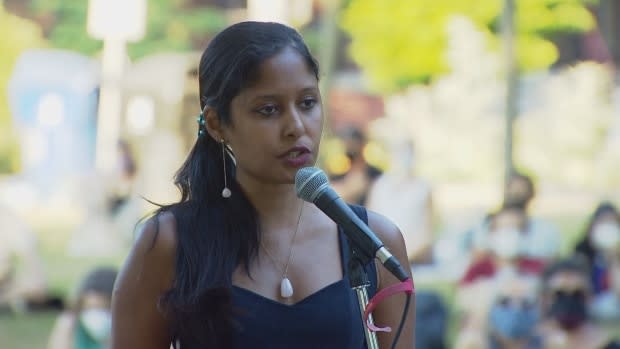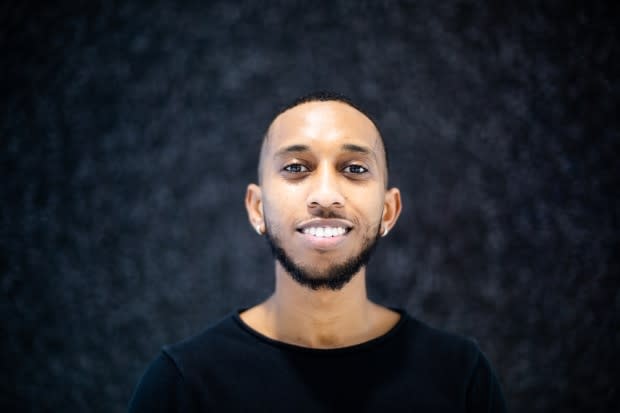Torontonians demand changes on first day of police reform meeting
Toronto must find a new way to deal with people in mental health crises and root out racism within its police force, concerned citizens said Thursday at a virtual town hall about police reform.
And the money to fund these new initiatives should come out of the existing police budget, many said.
The meeting — launched by the Toronto Police Services Board — is the first of a series of virtual town halls to allow the public to speak about reform and public safety, as calls in the city grow for greater police accountability.
"When we send police to a mental health call we criminalize disability," said Cybele Sack, a Toronto citizen who spoke at the town hall.
"Creating a new mental health service is an opportunity to innovate in service of the community with better outcomes and greater trust."
The board says it's the first time it's ever held a series of public meetings on these specific issues — and in this way.
"We have had other issues that have generated considerable public interest in the past but this response, and the forum we have chosen to hear from the public, is unprecedented," the board said in a statement, adding that the town hall was originally slated for one day, but three more have been scheduled to accommodate more speakers.
The other three will be held this Friday, Wednesday July 15, and Thursday, July 16.
Today's town hall began at 9 a.m. You can watch it below:
The virtual meetings come as momentum builds for police reform, starting with the killing of George Floyd by a white officer in Minneapolis back in May and the worldwide protests that followed. The death of Regis Korchinksi-Paquet after Toronto police were called to her family's apartment, and the fatal shooting of Ejaz Choudry by Peel police, have only made the calls louder.
However, Toronto city council voted against a motion last week that would have seen the 2021 police budget cut by at least 10 per cent, with the savings allocated to community services. And while there is a range of ideas within the community on what reform should look like, many are doubtful the town halls will bring those changes about.
'We're reluctant to call the police on mental health issues'
Beverley Salmon, who became Toronto's first Black city councillor in 1985, said it's time for a cultural change within the force.
"I have two sides to my family tree, the white side that experienced polite interactions with the police and the Black side not so much," said Salmon, who is the co-founder of the Urban Alliance on Race Relations.
"In fact, on both sides, we're reluctant to call the police on mental health issues."
She said now is the time for change, suggesting an outsider should take the helm of the force after Chief Mark Saunders retires at the end of July.
The new chief should be someone who "is not steeped in the current culture and can bring about the true systemic changes that are needed in policing," she said.
Saunders acknowledged to the police board a few weeks ago that systemic racism exists within his force.
Salmon said she used to work with new recruits at the police college in Aylmer, Ont., decades ago for race-relations training.
She said the entire training program at the college needs an overhaul as does recruitment.
"We need individuals who have the mentality to offer policing with sensitivity to the various people they serve," she said.
Jacqueline Edwards, president of the Association of Black Law Enforcers, also spoke at the meeting Thursday, urging the board to create an environment in which racism within the force can be called out without fear of repercussions.
"As a Black professional in the field of public safety and justice, I can tell you very personally that there really is a need for Black and racialized leaders within [Toronto police] to feel supported and encouraged to stand out and call out racism," Edwards said.
Community views
Groups like Black Lives Matter Toronto have made a number of calls, including to defund the police budget by 50 per cent, and for the money to be redirected to areas like housing, public health and anti-violence programs.
It's a call that has the support of many community groups.

"We want to show up as allies to Black and Indigenous folk and say that this is enough," said Meghana Rajanahally, who is part of a group of Davenport residents who staged a rally this week calling for the police to be defunded.
"And so we want to bring attention also to what needs to be created as an alternative to policing and where this money can go," Rajanahally added.
Other groups are also calling for greater transparency when it comes to the police budget.
"We're asking for … a line-by-line breakdown as to why the budget is going to where it's going and why not other areas," said Semir Bulle, co-founder of Doctors for Defunding Police.
"We want a cost-benefit analysis the same way we do in medicine for every dollar that is spent."

The group argues that policing has become a "public-health emergency," and it supports a move to create a non-police response team for mental-health calls.
Town hall, then what?
While those perspectives will likely be shared at the Toronto Police Services' Board town hall meetings, how much change the discussions will spark is unclear.
Some police reform advocates acknowledge the meetings — and the widespread public interest in them — are a step forward, but question what will happen after that.
"I think this is the moment for change that someone like me has been waiting for for 40 years," said John Sewell, co-ordinator of the Toronto Police Accountability Coalition.

"But my fear is that the Police Services Board will stand in the way of change as they have in the past … They're always willing to listen to people. But when it comes to doing things, they don't do anything," said Sewell, who is a former mayor of Toronto.
Alok Mukherjee, who spent more than 10 years as the chair of the Toronto Police Services Board, also acknowledges the four days of town hall meetings are "significant."
But he says many of the changes that community groups are calling for involve higher levels of government stepping in.
"The question is whether there is the political will to do it."


